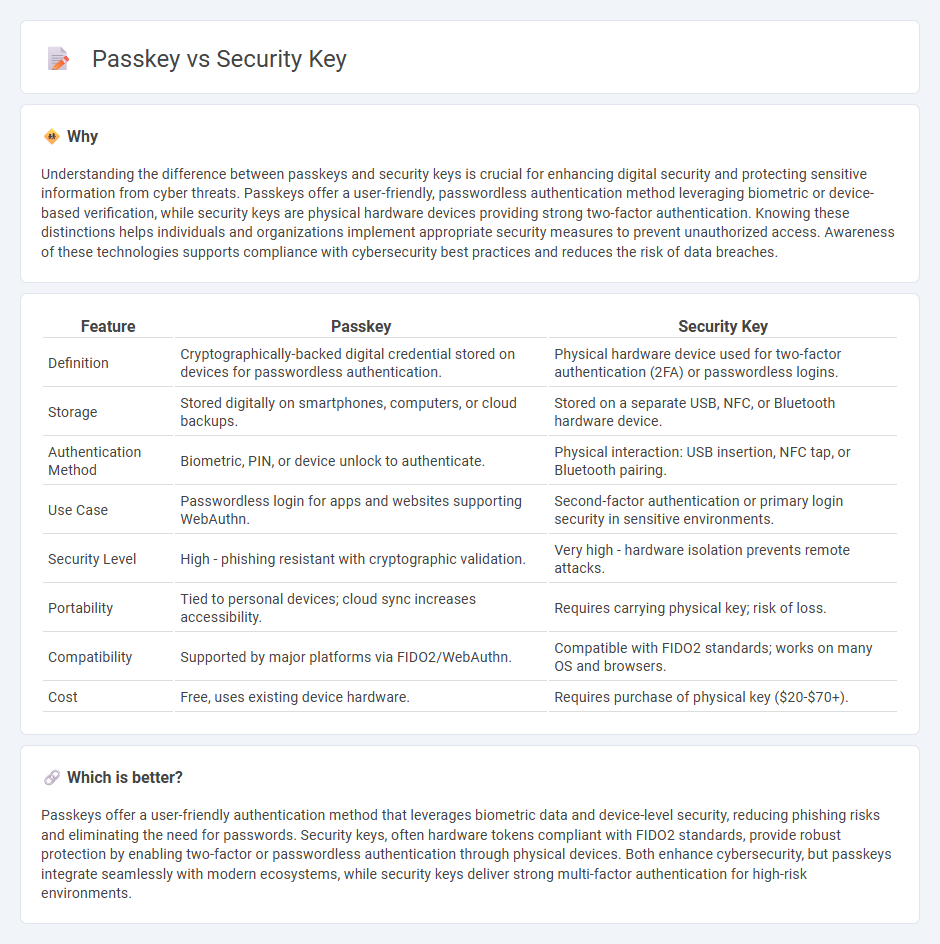
Passkeys leverage biometric data and cryptographic protocols to offer a seamless and phishing-resistant authentication method, surpassing traditional passwords in security and user experience. Security keys are physical devices that generate cryptographic credentials to authenticate users securely, minimizing risks from phishing and unauthorized access. Explore the nuances between passkeys and security keys to enhance your digital security strategy.
Why it is important
Understanding the difference between passkeys and security keys is crucial for enhancing digital security and protecting sensitive information from cyber threats. Passkeys offer a user-friendly, passwordless authentication method leveraging biometric or device-based verification, while security keys are physical hardware devices providing strong two-factor authentication. Knowing these distinctions helps individuals and organizations implement appropriate security measures to prevent unauthorized access. Awareness of these technologies supports compliance with cybersecurity best practices and reduces the risk of data breaches.
Comparison Table
| Feature | Passkey | Security Key |
|---|---|---|
| Definition | Cryptographically-backed digital credential stored on devices for passwordless authentication. | Physical hardware device used for two-factor authentication (2FA) or passwordless logins. |
| Storage | Stored digitally on smartphones, computers, or cloud backups. | Stored on a separate USB, NFC, or Bluetooth hardware device. |
| Authentication Method | Biometric, PIN, or device unlock to authenticate. | Physical interaction: USB insertion, NFC tap, or Bluetooth pairing. |
| Use Case | Passwordless login for apps and websites supporting WebAuthn. | Second-factor authentication or primary login security in sensitive environments. |
| Security Level | High - phishing resistant with cryptographic validation. | Very high - hardware isolation prevents remote attacks. |
| Portability | Tied to personal devices; cloud sync increases accessibility. | Requires carrying physical key; risk of loss. |
| Compatibility | Supported by major platforms via FIDO2/WebAuthn. | Compatible with FIDO2 standards; works on many OS and browsers. |
| Cost | Free, uses existing device hardware. | Requires purchase of physical key ($20-$70+). |
Which is better?
Passkeys offer a user-friendly authentication method that leverages biometric data and device-level security, reducing phishing risks and eliminating the need for passwords. Security keys, often hardware tokens compliant with FIDO2 standards, provide robust protection by enabling two-factor or passwordless authentication through physical devices. Both enhance cybersecurity, but passkeys integrate seamlessly with modern ecosystems, while security keys deliver strong multi-factor authentication for high-risk environments.
Connection
Passkeys and security keys enhance digital authentication by replacing traditional passwords with cryptographic methods, ensuring stronger protection against phishing and credential theft. Security keys are physical devices that store cryptographic secrets used in passkey authentication, enabling seamless, passwordless logins across various platforms. This integration leverages public-key cryptography to verify user identity securely while maintaining user convenience and reducing reliance on vulnerable password systems.
Key Terms
Authentication
A security key is a physical hardware device used for two-factor authentication, enhancing protection with cryptographic protocols such as FIDO2 and U2F. A passkey, by contrast, is a digital credential stored on devices like smartphones, offering passwordless login through biometric data or PIN verification, improving user convenience while maintaining strong security. Explore the latest advancements in authentication technologies to find the best fit for your security needs.
Encryption
Security keys use asymmetric encryption protocols such as FIDO2 and U2F to provide a physical two-factor authentication method, ensuring data privacy through cryptographic key pairs. Passkeys also rely on public-key cryptography but integrate more seamlessly with device ecosystems, eliminating the need for passwords while maintaining robust encryption standards. Explore the detailed comparison of encryption techniques and usability between security keys and passkeys to strengthen your digital security strategy.
Credential
Security keys are physical devices that store cryptographic credentials used for two-factor authentication (2FA), providing a secure way to verify user identity without relying on passwords. Passkeys, based on the FIDO2 standard, function as passwordless credentials that replace traditional passwords with a combination of a device-stored private key and a cloud-stored public key, enhancing security and user convenience. Discover more about how credential types impact secure authentication methods.
Source and External Links
About Security Keys for Apple Account - A small external hardware device that provides an extra layer of authentication for your Apple Account, replacing the six-digit code in two-factor authentication for enhanced security against phishing attacks.
Titan Security Key - A FIDO2-compatible hardware key engineered by Google to prevent phishing and secure accounts--works with the Advanced Protection Program and many online services.
Security Key Series | YubiKeys - Hardware keys that support FIDO2, U2F, WebAuthn, and passwordless login across desktops, laptops, and mobile devices, with no software or battery required for authentication.
 dowidth.com
dowidth.com